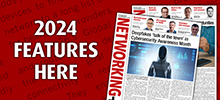06 November 2024

John McKindland, Head of Partner Channel, UK, Sona Business
Which law would you most like to change?
Tax and immigration laws. We are devoid of certain skills sets in this country and it’s getting harder for people with those skill sets to get into the country and work and contribute. The NHS has suffered because of this. We need to make it easier for skilled workers to come to the UK and not restrict the numbers because illegal migration is so high. Tax is the government’s only source of income to run our services. There are too many loopholes and too many sticking plaster fixes. The whole thing needs ripping up and starting again to make the tax burden fairer for all.
Who was your hero when you were growing up?
My uncle who was a fireman in the RAF. He won awards for bravery such as jumping on burning aircraft to save the pilots. He would tell the story as though it was nothing and just doing his job, which he was. But I was always struck by his courage, his calm and cool-headed approach to everything. I am proud to be named after him.
What was your big career break?
Without a doubt telecoms distributor Rocom in 1996. I found myself in a career desert and landed at the right place, right time and most importantly the right people who are still friends today. I learnt a lot from Rocom which has guided my career through distribution, networks and MSPs ever since.
What did you want to be when you were growing up?
It was always the military; we are a military family with every generation serving for the last 150 years so it was a given I would join the Army and did so at 16. Opportunities to do anything else were limited at that time and it was the right choice. I enjoyed 12 years in the Royal Signals and would have stayed longer but with my daughters back in the UK and no real hope of a UK posting it wasn’t a difficult decision to leave and start a new career in telecoms.
If you could dine with any famous person, past or present, who would you choose?
Winston Churchill. I would love to hear his stories of his time as journalist in South Africa and of course just how much of close-run thing was 1940 and the Battle of Britain. I can’t even begin to understand the weight of the burden he carried. Having led the nation through war I wonder what he must have felt following a devasting election defeat in July 1945. I am sure the brandy and cigars would figure somewhere in the evening.
The Rolling Stones or the Beatles?
Rolling Stones up to 1973 and then it would be Pink Floyd.
What’s the best piece of advice you’ve been given?
My role in the military required accuracy with no wiggle room for errors. Everything was black and white. Moving through my civilian career, I was once advised to learn to live in the grey, and that it was more important to be effective than right. Managing a large team, I had to learn to empower and listen to my staff, sit back and allow them to present their data and opinion so we could understand the bigger picture and act meaningfully. It was a learning experience, and it took a while for me to adapt and change. The first year was painful.
If you had to work in a different industry, which would you choose?
Right now, it would be renewable energy; in terms of technical development and advancement that it is the place to be over the coming years. It’s an industry that will shape future generations and how they live and work.
What would you do with £1 million?
I’d build a solid financial base to power the next stage of my family’s lives and careers. Secure our future generationally and look to see how we can make a positive effect on our local community.
Where would you live if money was no object?
I got married on the Amalfi coast in Italy in 2019 and fell in love with the area, but a recent trip to Westport in Ireland really has turned my head and I think that would be a great place to retire to.
What’s the greatest technological advancement in your lifetime?
It has to be the mobile phone. It has driven development of nano technologies used in so many industries, created powerful voice and data networks, applications for everyday life and of course revolutionised the camera industry. Sadly, it’s probably also the worst advancement when you look at the effect on people’s mental health. We need to learn to use our tech better.










